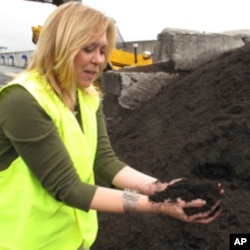In the northwestern United States, the city of Seattle requires its residents to separate food waste from the rest of their trash. The food gets recycled into compost for lawns, gardens and, soon, into electricity.
Every day, at Cedar Grove Composting north of Seattle, truck after truck pulls into this huge warehouse to dump loads of food and yard waste.
"There's a nice mix of green waste and material. We actually have different seasons here in the tipping building," says Susan Thoman, business development director for Cedar Grove. "There's pumpkin season, that's the first of November after Halloween. We have Christmas tree season, which is obviously the first part of January after the holidays."
According to Thoman, food waste and yard waste are currently all dumped in a pile together. Then they're mixed with microbes, ground up, and poured in long, covered rows to biodegrade for a month.
The people who work at Cedar Grove talk about compost the way chefs talk about food. Thoman digs her hands into a rich, dark pile of the finished product.
"This is what it's all about, though, here. This is what those wonderful things we divert from the landfill turn into."
Alternative energy
Now Cedar Grove has a new recipe in mind for its food waste. Before turning banana peels and bread crusts into compost, the company wants to use them to create alternative energy.
Food waste would be separated and sprinkled with bacteria to help the food begin to break down. Then it would be poured into a closed container called an anaerobic digester, where the decomposing food would start releasing large amounts of methane.
Instead of letting that methane escape into the atmosphere, where it could contribute to global warming, Cedar Grove would suck it up and store it. Then they could burn it, to power and heat the compost facility.
Lawrence Klein, technology and development planner for Cedar Grove, says they could also convert the gas from the food waste to compressed natural gas, to fuel their trucks.
"I mean, it's a beautiful image," says Klein. "It's taking a waste product and then driving down the highway with it. I'm excited about it."
Electrifying waste
The natural gas could also provide electricity.
"That's somewhere in the lines of eight million to 10 million kilowatt hours per year," says Klein. "That's comparable to about 400-plus Seattle homes."
Turning food waste into biogas would make food recycling more profitable - especially because the food could still be used for compost after the gas-extraction process.
"Garbage is the key to sustainability," says Sally Brown, a soils scientist at the University of Washington. According to Brown, turning food scraps into energy may be new to Americans, but it's well-established in Europe.
"It's not the whole solution, but it's something that we have the technology in hand and it's something that can be done right away to provide a significant amount of electricity."
Wastewater treatment plants around the country already use anaerobic digesters to produce biogas from solid waste. Brown says food waste is even more efficient because it hasn't been eaten yet. That means it's still full of calories - and calories are energy.
Cedar Grove has gotten a million-dollar grant from the state government to pursue its food-to-fuel plan. The company is in the design and permitting phase.
Once construction starts, it could be up and running within a year.













